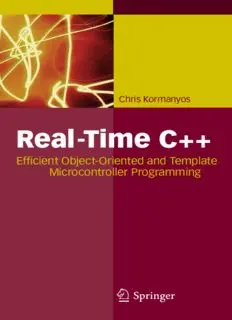Table Of ContentChris Kormanyos
Real -Time C++
Efficient Object-Oriented and Template
Microcontroller Programming
123
Real-Time C++
Christopher Michael Kormanyos
Real-Time C++
Efficient Object-Oriented and Template Micro-
controller Programming
123
ChristopherMichaelKormanyos
Reutlingen
Baden-Württemberg
Germany
ISBN978-3-642-34687-3 ISBN978-3-642-34688-0(eBook)
DOI10.1007/978-3-642-34688-0
SpringerHeidelbergNewYorkDordrechtLondon
LibraryofCongressControlNumber:2013931231
ACMComputingClassification(1998):C.3,D.2,C.5,B.1
(cid:2)c Springer-VerlagBerlinHeidelberg2013
Thisworkissubjecttocopyright.AllrightsarereservedbythePublisher,whetherthewholeorpartof
thematerialisconcerned,specificallytherightsoftranslation,reprinting,reuseofillustrations,recitation,
broadcasting,reproductiononmicrofilmsorinanyotherphysicalway,andtransmissionorinformation
storageandretrieval,electronicadaptation,computersoftware,orbysimilarordissimilarmethodology
nowknownorhereafterdeveloped.Exemptedfromthislegalreservationarebriefexcerptsinconnection
with reviews or scholarly analysis or material supplied specifically for the purpose of being entered
and executed on a computer system, for exclusive use by the purchaser of the work. Duplication of
this publication or parts thereof is permitted only under the provisions of the Copyright Law of the
Publisher’slocation,initscurrentversion,andpermissionforusemustalwaysbeobtainedfromSpringer.
PermissionsforusemaybeobtainedthroughRightsLinkattheCopyrightClearanceCenter.Violations
areliabletoprosecutionundertherespectiveCopyrightLaw.
Theuseofgeneraldescriptivenames,registerednames,trademarks,servicemarks,etc.inthispublication
doesnotimply,evenintheabsenceofaspecificstatement,thatsuchnamesareexemptfromtherelevant
protectivelawsandregulationsandthereforefreeforgeneraluse.
While the advice and information in this book are believed to be true and accurate at the date of
publication,neithertheauthorsnortheeditorsnorthepublishercanacceptanylegalresponsibilityfor
anyerrorsoromissionsthatmaybemade.Thepublishermakesnowarranty,expressorimplied,with
respecttothematerialcontainedherein.
Printedonacid-freepaper
SpringerispartofSpringerScience+BusinessMedia(www.springer.com)
To thosewho pursuetheartoftechnical
creativity
Preface
Thisbookisapracticalguidetoprogrammingreal-timeembeddedmicrocontroller
systems in C++. The C++ language has powerful object-oriented and template
features that can improve software design and portability while simultaneously
reducingcode complexity and the risk of error. At the same time, C++ compiles
highlyefficientnativecode.ThisuniqueandeffectivecombinationmakesC++well
suited for programming microcontroller systems that require compact size, high
performance,andsafety-criticalreliability.
Thetargetaudienceofthisbookincludeshobbyists,students,andprofessionals
interested in real-time C++. The reader should be familiar with C or another pro-
gramminglanguageandshouldideallyhavehadsomeexposuretomicrocontroller
electronics and the performance and size issues prevalent in embedded systems
programming.
AboutThisBook
This is an interdisciplinary book that includes a broad range of topics. Real-
worldexampleshavebeencombinedwithbriefdescriptionsinanefforttoprovide
an intuitive and straightforward methodology for microcontroller programming
inC++.Efficiencyisalwaysinfocus,andnumerousexamplesarebackedupwith
real-timeperformancemeasurementsandsize analysesthatquantifythetruecosts
ofthecodedowntotheverylastbyteandmicrosecond.
Throughoutthechapters,C++isusedinabare-bones,no-frillsfashionwithout
relying on any libraries other than those specified in the language standard itself.
Thisapproachfacilitatesportability.
Thisbookhasthreepartsandseveralappendices.Thethreepartsgenerallybuild
oneach otherwith the combinedgoalof providinga coherentand effectivesetof
C++methodsthatcanbeusedwithawiderangeofembeddedmicrocontrollers.
vii
viii Preface
• Part I provides a foundation for real-time C++ by covering language
technologies. Topics include getting started in real-time C++, object-oriented
methods,templateprogramming,andoptimization.Thefirstthreechaptershave
aparticularlyhands-onnatureandareintendedtoboostcompetenceinreal-time
C++.Chapter6hasauniqueandimportantroleinthatitiswhollydedicatedto
optimizationtechniquesappropriateformicrocontrollerprogramminginC++.
• Part II presents detailed descriptions of a variety of C++ components that are
widely used in microcontroller programming.These componentscan be either
usedaspresentedoradaptedforotherprojects.Thispartofthebookusessome
of C++’s mostpowerfullanguageelements, suchas class types,templates, and
the STL, to develop components for microcontroller register access, low-level
drivers,custommemorymanagement,embeddedcontainers,multitasking,etc.
• Part III describes mathematical methods and generic utilities that can be
employedtosolverecurringproblemsinreal-timeC++.
• The appendices include a C++ language tutorial, information on the real-time
C++ developmentenvironment, and instructions for building GNU GCC cross
compilersandamicrocontrollercircuit.
C++ is a rich language with many features and details, the description of
which can fill entire bookshelves. This book, however, primarily concentrates on
how to use C++ in a real-time microcontroller environment. Along those lines,
C++ language tutorials have been held terse, and information on microcontroller
hardware and compilers is included only insofar as it is needed for the examples.
A suggested list of additional reading material is given in Chap.17 for those
seeking supplementary information on C++, the C++ standard library and STL,
software design, C++ coding guidelines, the embedded systems toolchain, and
microcontrollerhardware.
Whenunitsareneededtoexpressphysicalquantities,theMKS(meter,kilogram,
second)systemofunitsisused.
CompanionCode,Targets, andTools
Thecompanioncodeincludesthreeintroductoryprojectsandonereferenceproject.
TheintroductoryprojectstreatvariousaspectsofthematerialpresentedinChaps.1
and2. Thereferenceprojectis largerin scope andexercisesmanyofthe methods
fromallthechapters.
Thecompanioncodeisavailableat
https://github.com/ckormanyos/real-time-cpp
TheC++techniquesinthisbookspecificallytargetmicrocontrollersinthesmall-
to-mediumsizerange.Here,small-to-mediumspansthefollowingapproximatesize
andperformanceranges:
Preface ix
• 4kB:::1-MBprogramcode
• 256byte::: 128-kBRAM
• 8bit:::32–bitCPU
• 8MHz:::200-MHzCPUfrequency
Mostofthemethodsdescribedinthisbookare,however,scalable.Assuch,they
canbeusedequallywellonlargerorsmallerdevices,evenonPCsandworkstations.
Inparticular,theycanbeemployediftheapplicationhasstrictperformanceandsize
constraints.
A popular 8–bit microcontroller clocked with a frequency of 16MHz has
been used as the primary target for benchmarking and testing the code samples
in this book. Certain benchmarks have also been performed with a well-known
32–bitmicrocontrollerclocked at 24MHz. An 8–bit microcontrollerand a 32–bit
microcontroller have been selected in order to exercise the C++ methods over a
widerangeofmicrocontrollerperformance.
All the C++ examples and benchmarks in the book and the companion code
havebeencompiledwithGNUGCCversions4.6.2and4.7.0.Certainexamplesand
benchmarkshavealsobeencompiledwithotherPC-basedcompilers.
ThemostrecentspecificationofC++11inISO/IEC14882:2011isusedthrough-
outthetext.Atthetimethisbookiswritten,thespecificationofC++11isbrand-new.
The adventof C++11 has made C++ significantly more effective and easy to use.
Thiswill profoundlyinfluenceC++ programming.The well-informedreaderwill,
therefore, want to keep in touch with C++11 best practice as it evolves in the
developmentcommunity.
Notes onCodingStyle
A consistentcodingstyle is used throughoutthe examplesin this bookand in the
companioncode.
Code samples are written with a fixed-width font. C++ language key-
wordsandbuilt-intypesusethesamefont,buttheyareinboldface.Forinstance,
constexpr int version = 7;
Ingeneral,thenamesofallsymbolssuchasvariables,classtypes,members,and
subroutinesare written in lowercase. A single underscore(_) is used to separate
words and abbreviationsin names. For instance, a system-tick variable expressed
withthisstyleisshowninthecodesamplebelow:
unsigned long system_tick;

